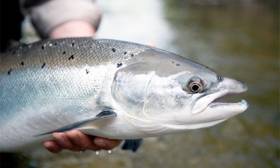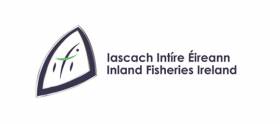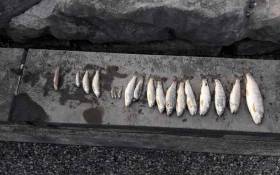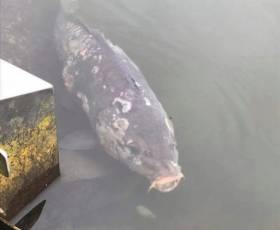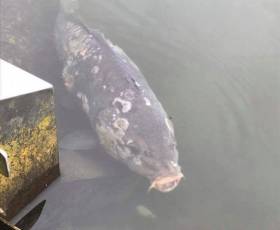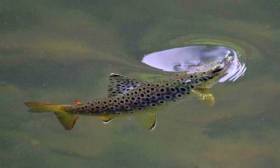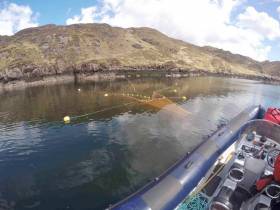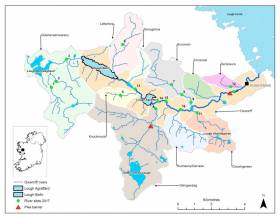Displaying items by tag: Inland Fisheries Ireland
#Fishing - Sean Kyne TD, Minister with responsibility for the inland fisheries sector, today (Thursday 21 June) welcomed the positive outcome from the international discussions at the North Atlantic Salmon Conservation Organisation (NASCO) annual meeting in Portland, Maine, USA.
“Our departmental officials and those of Inland Fisheries Ireland represented Ireland at the negotiations as part of the EU delegation,” Minister Kyne said. “They joined delegates from the EU, USA, Canada, Norway, the Russian Federation, Greenland and the Faroes.
“The outcome of the week-long discussions is that, for the period 2019-2022, no harvest fishery will take place off the Faroe Islands and the restrictions on the fishery off West Greenland have been strengthened.
“I am pleased that these two important regulatory measures were agreed in a spirit of international c-ooperation.”
Minister Kyne emphasised the importance of these measures for Irish salmon migrating to distant feeding grounds before returning to their natal rivers in adulthood to spawn.
“The migratory stock complex travelling through Faroese waters comprises a majority component of European river stocks, including those from Ireland, and the measure to have no commercial fishing in these waters is important for these vulnerable stocks,” he said.
“I am particularly pleased that the discussions on the Faroes area were chaired by Ireland, on behalf of the EU.”
The majority component of the stock complex migrating to Greenlandic waters originates from the North American continent, and the restriction on fishing in this area assists these stocks as well as the smaller European component.
The agreed level of potential catch, for the internal use fishery in Greenland, is reduced by some 33% over the quota set in each of the last three years. Agreement was also reached on increased monitoring and control of the fishery.
The NASCO meeting also considered the factors that affect the marine survival of Atlantic salmon, with scientists, including those from IFI, engaged in cutting edge work to identify and address those causes.
Determining why salmon are dying at sea before they can come back to their natal rivers to spawn is a key research priority.
A new innovative approach to oceanic long range acoustic monitoring, ‘ROAM’ (RAFOS Ocean Acoustic Monitoring), will allow salmon to be tracked through the marine environment. The approach is intended to overcome many of the significant challenges associated with tracking Atlantic salmon throughout their extensive marine migration.
Minister Kyne concluded that the measures taken in Ireland, over a decade ago, to protect migratory salmon stocks have pointed the way internationally and the latest agreements at NASCO demonstrate restraints on exploiting Irish and other stocks as they migrate outside our waters.
#Angling - The Salmon Conservation and Midland Fisheries Funds are now open to projects for habitat restoration and conservation, as announced earlier this week by Sean Kyne TD, Minister of State with responsibility for inland fisheries.
The closing date for applications to these schemes, as part of Inland Fisheries Ireland’s (IFI) National Strategy for Angling Development, is Thursday 12 July.
The National Strategy for Angling Development aims to ensure that Ireland’s fish stocks and angling infrastructure are protected and enhanced with a view to ensuring a sustainable habitat and delivering the economic, health and recreational benefits they offer to communities across Ireland.
The Salmon Conservation Fund is generated from the sale of salmon and sea-trout licences and reinvested in projects that will assist in the conservation of salmon.
“As the Conservation Fund is financed via a portion of licence sales for both Salmon and Sea Trout, I asked IFI to develop a revised scheme that will include sea trout conservation projects and update the existing salmon-only scheme,” Minister Kyne said.
“As a first step to realising a full scheme for sea trout, this year’s fund is open to accepting a pilot sea trout project for the Waterville area.”
Applications to the Salmon Conservation and Midland Fisheries Funds must relate to conservation habitat improvement projects.
Applications may be made online and are invited for projects that are ‘ready to go’, ie that have all the necessary paperwork and permissions in place and can move to delivery following successful progression through evaluation and award stages. Such projects would include, for example, a second or subsequent phase of an existing scheme.
Successful applications must meet the requirements of the IFI Environmental Assessment process.
IFI’s current priority is to ensure projects already awarded funding under the recent National Strategy for Angling Development schemes up to and including 2017 are completed and project officers continue to assist applicants to bring these projects to delivery phase.
To this end, project officers are engaging with groups and other Government agencies. Ready-to-go projects should be timed to complete by end of September 2018.
Meanwhile, IFI has issued an appeal to farmers to remain vigilant during the summer months when harvesting silage and spreading slurry to avoid water pollution and the loss of nutrients into rivers, lakes and other watercourses.
The appeal comes on the back of last week’s major fish kill in Claremorris, where over 1,000 wild brown trout and other species died as a result of a suspected agricultural silage leak.
Silage operations will be ongoing all summer and silage effluent has the potential to cause devastating pollution in streams and rivers.
Such effluent is a significant polluting substance, starving fish and invertebrate life of oxygen, resulting in potentially massive fish kills if it enters a watercourse.
With some rivers low during summertime with little dilution capacity, the effect of a small leak can cause huge damage.
IFI is advising farmers to follow its simple six-point plan to ensure good farmyard management and reduce their risk of polluting:
- Use round bales as the most environmentally friendly way to store silage.
- If a silage pit is being used, ensure it is properly sealed to prevent leakage from under the slab.
- Carry out slurry spreading in dry weather and never when heavy rain is forecast.
- Never spread slurry close to a watercourse, be aware of the slope of land to the watercourse.
- Do not clean tanks beside any watercourse, stream or a river.
- Do not allow any effluent or washings to enter any rainwater gully.
On Thursday 17 May, 2018 Inland Fisheries Ireland received a report of a fish kill on Ballycorrigan stream and near the confluence with the River Shannon in Ballina, Co. Tipperary. Staff observed approximately 100 brown trout of various age groups, three juvenile salmon and a stone loach dead in an approximately 100 m stretch from the Ballina Waste Water Treatment Plant discharge pipe to the confluence with the River Shannon. There are live fish upstream of the WWTP.
According to IFI, preliminary investigations have indicated that maintenance works carried out during the day in the Ballina WWTP may have caused 'a deleterious or polluting effluent to discharge to this stretch of river causing the observed fish mortality'.
IFI are continuing to investigate the cause of the fish mortality and are working with Irish Water and the EPA in this regard.
Cork City Fish Kill: Carp Test Positive For Edema Virus
#Angling - Scientists of the Fish Health Unit at the Marine Institute have advised that sample carp taken from The Lough and Belvelly Lake in Cork have tested positive for carp edema virus, or CEV.
The poxvirus causes a disease known as ‘koi sleepy disease’ in both koi and common carp.
The fish kill was first reported at The Lough in Cork city centre last week, with subsequent reports at Belvelly Lake in Cobh. Some 450 carp were removed from the former, and over 20 from the latter, as well as live samples from both for analysis.
At present, while tests are ongoing and further tests are carried out on the CEV detected, this is being treated as a ‘suspect positive’ and is not confirmed as the causative agent of the mortalities until all tests have been completed.
Inland Fisheries Ireland (IFI) recommends that stringent biosecurity protocols continue to be implemented. All mortalities continue to be removed and disposed of in a bio-secure manner.
Angling remains suspended at both locations, as well as at Inniscarra and Carrigadrohid Reservoirs.
#Angling - Inland Fisheries Ireland yesterday (Friday 4 May) responded to reports of a fish kill at The Lough in Cork city centre.
The reports were received from Cork Carp Anglers Club who recorded a number of dead fish at this iconic Cork carp fishery.
Initial investigations by IFI indicate the cause of death to be a fish health issue, with a bacterial or fungal infection suspected of causing the mortalities.
It is estimated that in the region of 200 carp have been infected in this outbreak.
A small number of live fish have been securely transported to a specialist fish health unit to identify the infectious agent.
All dead fish that have been collected are being held in cold storage at an IFI facility pending the outcome of tests to determine the exact cause of death.
Anglers are requested to suspend all fishing activity at the lake until further notice.
Any anglers who have been fishing the venue in the last month are advised to carry out appropriate disinfection of their landing nets, fish mats, footwear and other gear that may have become contaminated, to prevent the spread of the disease to other fisheries.
#Angling - A new campaign is designed to alert anglers to renewed efforts to detect those who either take undersize trout or more trout than the rules allow.
Operation Ephemera is specifically focused on anglers fishing for trout during the annual hatch of the mayfly, and takes its name from its species name, Ephemera danica.
Mayfly season is traditionally the busiest time of year on Ireland’s prime wild brown trout limestone lakes, when fish are feeding on the surface and are ‘easier’ to catch.
The campaign will focus on Loughs Corrib, Mask, Carra, Conn, Cullen and Arrow, all in the west, and Loughs Sheelin, Owel, Ennell, Derravaragh and Ree in the Shannon catchment.
Anglers found flaunting the law will receive a fixed charge penalty notice, which attracts a fine of €150 which, if remaining unpaid after 30 days, will result in prosecution.
Compliance with other relevant angling regulations and rules, including relevant permit conditions which pertain on certain lakes, will also be enforced.
“Over recent years, we have been seeking the views of the angling public as to what they wanted IFI to do more of in terms of fisheries management in the coming years,” said Greg Forde, head of operations at Inland Fisheries Ireland.
“The theme that kept being repeated was that anglers wished to see more protection of the fisheries resource. Ultimately, there is a concern amongst anglers that not everyone on our lakes abide by the strict regulations that are in place to protect these extremely important wild brown trout and the mayfly period is when fish are most vulnerable.
“With Operation Ephemera, we are reminding anglers to familiarise themselves with the regulations pertaining to the lakes they are intending to fish and to abide by the law.
“We will also be highlighting the regulations and making leaflets available to anglers to help familiarise themselves with the rules.”
The campaign will be concentrated in May, but with hatches being late in some areas this year, this may extend into June.
It is appreciated that many anglers practice catch and release. But where trout are permitted to be retained, it is important that this is within the strict regulations for the respective lakes.
Anglers are also reminded that when fishing in a lake boat, all passengers must wear a buoyancy aid or lifejacket.
#MarineNotice - Inland Fisheries Ireland (IFI) will be carrying out scientific sampling using bag nets and sentinel cages in Killary Harbour and surrounding waters.
Similar to last year’s operation, the bag nets will start at the shore and extend into the water approximately 25 meters. The sentinel cages (nets) will be anchored near shore and will not interfere with navigable waters.
All nets will be clearly marked with brightly coloured buoys with IFI identification so that any unintentional retrieval can be notified.
Deployment operations, which were set to begin on Thursday 12 April, are being carried out using the RIB Sea Breeze (Callsign EI-5724) and are subject to weather conditions. The nets will be checked daily, also weather dependent, and all sampling nets and buoys will be retrieved on Friday 8 June.
Full details of co-ordinates and contact information are included in Marine Notice No 17 of 2018, a PDF of which is available to read or download HERE.
#Angling - At a sitting of Ardee District Court on Monday 12 March, Irish Water pleaded guilty to the discharge of deleterious matter to the River Dee on 15 May 2017.
The offence related to a poor quality discharge from a wastewater treatment plant at Ardee, Co Louth.
The River Dee rises near Bailieboro in Co Cavan and flows through Co Meath and Co Louth, where it enters the Irish Sea at the village of Annagassan.
Michaela Kirrane, senior fisheries environmental officer with Inland Fisheries Ireland (IFI), told Judge Coughlan that during a routine inspection of the river on the 25 May last year, it was noted that the river appeared to be in a poor condition downstream of the discharge point from Ardee Wastewater Treatment Plant.
A series of water samples were taken and analysis confirmed that the discharge from the treatment plant was having a deleterious impact on the quality of the River Dee, an important brown trout fishery.
Irish Water co-operated fully with IFI’s investigation and remediation works were carried out. Upgrade works are currently underway to increase capacity at the wastewater treatment plant.
Irish Water was fined €4,500 with costs and expenses awarded to IFI amounting to €4,381.61.
Irish Water Prosecuted Over Lime Discharge & Fish Kill In River Varty
#FishKill - Irish Water pleaded guilty to the discharge of deleterious matter to the River Vartry one year ago, at a sitting of Bray District Court this past Tuesday (20 February).
The offence related to the accidental discharge of lime from their water treatment facility at Roundwood, Co Wicklow.
Roisin O’Callaghan, fisheries environmental officer with Inland Fisheries Ireland (IFI), told Judge Kennedy that, on 21 February 2017, IFI received a call that there had been an accidental spill of lime at the water treatment plant.
On investigation, O’Callaghan confirmed that the spill had resulted in a fish kill for approximately 500 metres downstream from the discharge.
A series of water samples were taken and analysis confirmed that the lime spill had altered the pH in the receiving water, resulting in the death of approximately 100 fish.
Irish Water co-operated fully with IFI’s investigation and initiated an immediate clean-up of the site.
Eoghan Cole BL, representing Irish Water, stated that following the clean-up, the Environmental Protection Agency had completed a dye survey on the drainage network to confirm that only clean surface water was discharging to the River Vartry.
Judge Kennedy commented on the significance of the River Vartry in supporting Atlantic salmon, sea trout, brown trout and lamprey.
Irish Water were fined €500 with costs and expenses amounting to €6,937.65.
Plan Published For Recovery Of Salmon & Trout Stocks In Owenriff Catchment
#Angling - Inland Fisheries Ireland has published its 2017 fish stock survey for the Owenriff catchment as well as its rehabilitation plan for the system to promote the recovery of brown trout and salmon in its lakes and rivers.
The Fish Stock Survey — which was conducted in the summer of 2017 and forms the basis for the Rehabilitation Plan — deduces that the introduction of pike into the catchment has been the significant factor in the declining fish stocks.
“As there are little or no major anthropogenic pressures in the catchment to cause the decline in fish stocks, it is reasonable to infer that the introduction of pike and their subsequent range expansion in the Owenriff catchment (with impacts of competition for food and space and predation on resident and migratory fish) is the main factor causing the decline of brown trout and salmon in the Owenriff catchment. Research from Europe and North America supports this finding,” the reports states.
Anthropogenic pressures include human-induced factors such as urban growth, deleterious discharges, farming activities and introduction of alien species.
Although pike were captured for the first time by IFI staff in 2009 in two lakes in the catchment (Loughs Bofin and Agraffard) and efforts were made by IFI staff to remove the pike from the system, they did not show up in two catchment-wide surveys in 1997 and 2007 and were only officially recorded in a survey for the first time in 2015.
However, the latest report, from the 2017 survey, confirms that pike are present all over the Owenriff catchment “in areas where they can freely gain access and in some areas where they cannot naturally gain access.”
Welcoming the publication of the two reports, Minister Sean Kyne TD said: “We have acted swiftly since the interim results of this survey became known. In late January, I announced that Inland Fisheries Ireland is to commence fish stock management operations on the Owenriff catchment to protect and restore trout stocks which have been impacted by recent introductions of pike to the catchment.
“The consequences of not taking wider remedial action on the basis of these survey results would lead to further decline in ecological biodiversity in the catchment, so I very much welcome the publication by IFI of the Owenriff Fish Population Rehabilitation Plan 2018.”
The minister continued: “The purpose of the plan is to develop a fisheries rehabilitation project that can be undertaken on the catchment to promote the recovery of the brown trout (both resident and migratory Corrib) and salmon populations in both lakes and rivers. It will take time and will be costly, but we are already underway with this very constructive and positive roadmap.”
With stock management actions having already commenced, the success of the broader rehabilitation project will depend on applying the correct tools to rehabilitate the brown trout and salmon populations in the Owenriff catchment.
These include fisheries enhancement works in selected sub-catchments to favour brown trout and salmon; genetic restoration; removing the problem (pike control); reducing anthropogenic impacts in the catchment; public awareness (especially in relation to the impacts of the introductions of species not indigenous to an area); interagency co-ordination; climate change mitigation; and any other necessary measures.
The Owenriff catchment is located on the north-western end of the Lough Corrib catchment, and the main Owenriff River drains into Lough Corrib Upper downstream of Oughterard, Co Galway. The Lough Corrib catchment itself is the largest and most important wild salmonid catchment in Ireland, and Lough Corrib is considered the premier wild brown trout fishery in Ireland.
The Owenriff rehabilitation plan and 2017 fish stock survey can both be downloaded from the IFI website. Afloat.ie also has more on IFI's stock management plan for Ireland's trout waters in 2018.


























